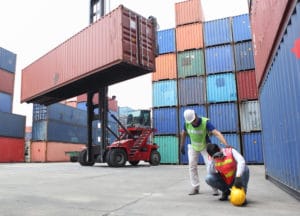
If you work in the maritime industry, you likely know about the hazards that come with this working environment. But do you know what to do if you suffer a maritime injury? Sadly, many maritime workers do not know what steps to take after maritime injuries occur. This can result in their losing out on opportunities for benefits and compensation.
Fortunately, Maritime Injury Guide is here to help. Below, we discuss five steps you can take after a maritime injury to ensure that you get the benefits you need.
5 Steps to Take after a Maritime Injury
Taking the right steps after a maritime injury can help ensure that your legal rights are protected and that you have access to the benefits and/or compensation needed to support your family. Here are our recommendations for five steps to take after a maritime injury:
1. Seek Medical Attention
After any maritime injury, the first thing you should do is seek medical attention. Even if you aren’t sure how bad the injury is, you should have it documented on your medical records. Maritime workers often report injuries that are not immediately obvious. Internal injuries are common, as are illnesses. Without proper treatment, injuries can worsen or become debilitating.
If at all possible, seek medical attention from your own doctor. Your employer may recommend a doctor, but you can usually see your own doctor instead. Make sure you tell your doctor about your accident, injury or illness, including that it happened at work.
2. Inform Your Employer
Depending on the nature of your injury or illness, your employer may be immediately aware of the situation. If not, then it is important to make sure you notify your employer in a timely manner. Your immediate health and wellness is most important, and if you have to leave work or are hospitalized, then you may not be as concerned about informing your employer.
Don’t rely on a co-worker to inform your employer. If possible, contact your employer as soon as possible to tell them what happened. If you already have medical records, provide a copy to your employer as well.
3. Gather Relevant Information
In order to receive compensation for your injuries, you will need to provide information to the insurance company and your employer. As soon as you are able, begin gathering relevant information, such as:
- Photos of the accident scene
- Any equipment involved in the injury
- Contact information for any witnesses at the scene
- Photos of your injuries
- Medical records
Documenting your injury and gathering evidence is important if you file any sort of maritime injury claim.
4. Do Not Submit Statements or Sign Any Documents
After a maritime injury, your employer or an insurance company may ask you for a statement. They may also ask you to sign documents. You should avoid doing both of these until you have consulted a maritime lawyer. What you say or sign can be used against you if you file a maritime injury claim. Here are some important things to remember:
- Never discuss your case with anyone other than a lawyer
- Do not post information about your injury on social media
- Do not provide any statements to insurance companies
- Never accept a settlement offer
- Do not sign any insurance documents without first consulting a lawyer
5. Seek Legal Guidance
We mentioned not making statements or signing documents without having a maritime lawyer review your case. Seeking legal guidance is incredibly important for maritime injury claims. Maritime laws are specific and complex. These laws are designed to protect maritime workers and ensure that they have coverage for injuries, which are not covered under traditional workers’ compensation laws.
Working with a skilled maritime lawyer is important because you then have access to legal knowledge and resources that support your claim and your best interests. Maritime injury claims can be complicated and can take time to resolve. You need to work with an attorney who is familiar with the process and how to successfully resolve these claims.
Maritime Injury Guide is Here to Help
If you are suffering an injury or illness due to your work on a vessel or rig, or in a shipyard, contact Maritime Injury Guide. Our maritime lawyers are skilled in handling claims involving the Jones Act, the Longshore and Harbor Workers’ Compensation Act (LHWCA) and the Death on the High Seas Act (DOHSA).
Let us help you explore your rights and your options for compensation. The types of compensation and benefits you qualify for will depend on the injury or illness, where the injury happened and the circumstances surrounding the injury or illness. We can help you sort through these elements and build a strong case.
Find out how we can help you by calling us at 866-871-8422. Or, you can also request a free injury consultation by completing our online contact form.
Source: